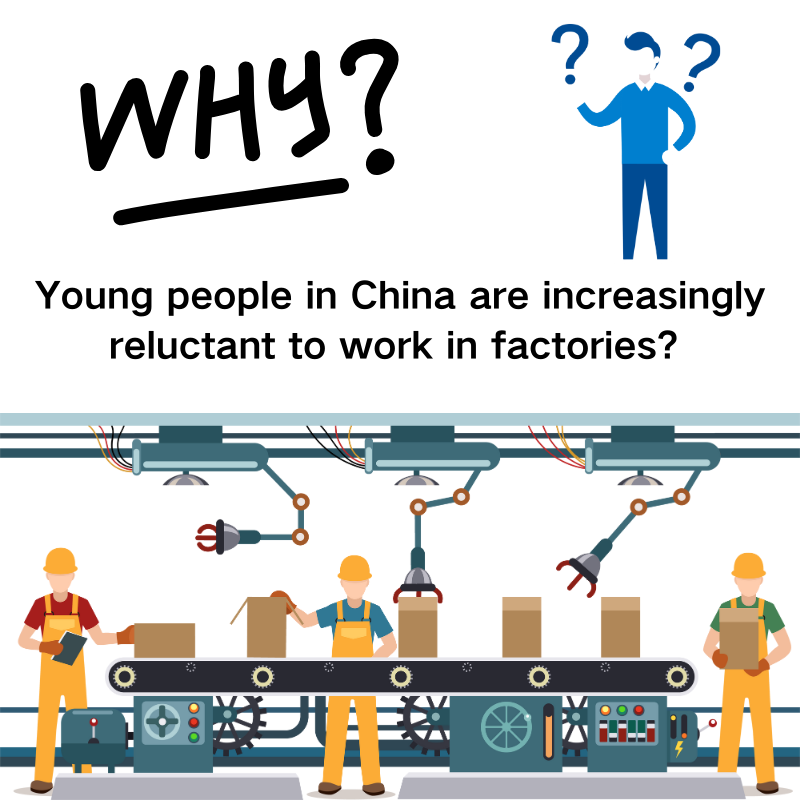Young people in China are increasingly Reluctant to Work in Factories
Young people in China are increasingly reluctant to work in factories due to a complex mix of social, economic, generational, and workplace factors. Here’s a detailed breakdown, reflecting the realities on the ground:
- Generational Shift in Values & Expectations:
- Higher Education Levels: Unlike their parents, a much larger proportion of the current young generation (post-90s, post-00s) has access to higher education (vocational college, university). They aspire to jobs that utilize their education and offer intellectual stimulation, not just manual labor.
- Rejection of “Suffering” Culture: Their parents’ generation endured harsh factory conditions as a necessary step out of poverty. Today’s youth, raised in relative prosperity (even if modest), prioritize work-life balance, personal well-being, and dignity. They are less willing to accept grueling conditions as inevitable.
- Aspirations for Upward Mobility: Factory work is widely perceived as a dead-end job with limited social status. Young people dream of careers in tech, finance, creative fields, or entrepreneurship – paths seen as offering higher prestige, better pay, and more dynamic futures.
- Harsh Working Conditions & Lack of Dignity:
- Long, Inflexible Hours: Standard 12-hour shifts (often 8am-8pm), 6-7 days a week are still common, especially during peak seasons. Mandatory overtime is frequent and often poorly compensated or enforced.
- Repetitive, Monotonous Tasks: Assembly line work is famously repetitive and mentally numbing, offering little engagement or skill development.
- Strict, Militaristic Management: Rigid rules, constant surveillance, harsh discipline (public reprimands, fines for minor infractions like talking or using a phone), and lack of autonomy are pervasive. Workers often feel treated like replaceable cogs, not humans.
- Poor Physical Environment: Noise, fumes, lack of comfortable break areas, and sometimes inadequate safety measures contribute to a physically and mentally draining environment.
- Limited Social Life: Long shifts and remote industrial park locations isolate workers, making it hard to build social connections or engage in leisure activities.
- Inadequate Compensation & Benefits:
- Stagnant Wages Relative to Cost of Living: While base wages have risen, they often haven’t kept pace with inflation, especially housing costs near factories. A decent standard of living frequently requires exhausting amounts of overtime.
- “Overtime Wage” Trap: Base salaries are often set low, with the expectation that workers must rely on substantial overtime to earn a livable income. This traps workers in long hours.
- Poor Social Security & Benefits: Compliance with mandatory social insurance (pension, medical, unemployment) is inconsistent. Some factories find loopholes or only partially contribute. Benefits like paid leave, health checks, or housing/meal subsidies are often minimal or non-existent.
- Pay Disputes: Delayed or withheld wages, especially for migrant workers, remain a problem, eroding trust.
- Lack of Career Development & Future Prospects:
- Limited Upward Mobility: Most factory jobs offer minimal training and few clear paths for promotion beyond low-level supervisory roles. Advancement often feels arbitrary or based on connections rather than merit.
- Skill Stagnation: The highly specialized, repetitive nature of many tasks means workers don’t acquire easily transferable skills, making it hard to switch jobs or industries later.
- Perceived Dead-End: The job offers little long-term career trajectory. Young people see it as a temporary, undesirable stopgap, not a viable career.
- Low Social Status & Stigma:
- Societal Perception: Factory workers (“dagong” culture) are often looked down upon. The work is associated with low education, rural origins, and lack of ambition. This stigma affects self-esteem and social standing, including in marriage markets.
- Internalized Shame: Young people, especially those with some education, feel ashamed to tell friends or family they work on an assembly line, fearing judgment.
- Availability of Alternatives:
- Service Sector Boom: Jobs in food delivery (Meituan, Ele.me), ride-hailing (Didi), e-commerce logistics, sales, hospitality, and customer service offer comparable or better pay, significantly more flexibility (choosing hours), less physical drudgery, and often better working environments within cities. These jobs feel more modern and autonomous.
- Gig Economy & Flexibility: The appeal of being one’s own boss (even nominally, as a gig worker) and controlling one’s schedule is strong compared to the rigid factory regime.
- Rise of New Industries: Opportunities in tech, digital content creation, online sales, and other internet-based sectors are highly attractive and align more with youthful aspirations and lifestyles.
- Demographic Reality & Increased Leverage:
- Shrinking Youth Population: The one-child policy resulted in a smaller cohort of young workers entering the labor market. This gives them more choice and bargaining power. Factories now compete harder for a smaller pool of labor.
- Higher Baseline Expectations: Raised in a period of rapid economic growth and digital connection, young workers simply expect more – better conditions, more respect, and a better life – than previous generations were conditioned to accept.

In Essence:
Young Chinese today see traditional factory work as embodying the opposite of their aspirations: low status, physically demanding, mentally numbing, poorly paid relative to effort, insecure, isolating, and offering no meaningful future. They have viable alternatives in the service and digital economies that, while not perfect, offer more autonomy, flexibility, better perceived status, and align more closely with their modern lifestyles and values. The factory model, largely unchanged for decades, is fundamentally unattractive to this generation raised with higher expectations and more options. The reluctance is a rational response to the realities of the jobs available versus the opportunities and lifestyle they desire.


 Supply Chain In China
Supply Chain In China